The Panathenaic Way: Athens’ Historic Pathway Comes Alive...
A major restoration project is bringing...
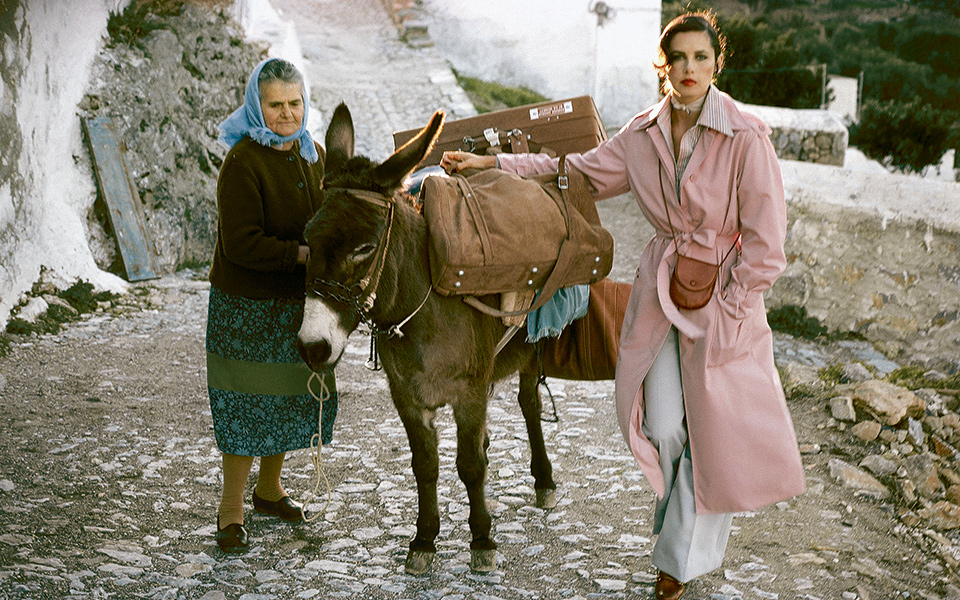
Famous Canadian model Dayle Haddon poses with a Lindos resident and her donkey, during a fashion shoot for Vogue Magazine in 1976.
© Jacques Malignon/Conde Nast/Getty Image/Ideal Image
Βack in the 1920s, an Italian documentary titled “L’Estate a Rodi” was made. Its purpose was not solely tourism promotion; it was filmed and shown in the context of Fascist propaganda. It was, however, the first time Rhodes had been presented to a European cinema audience.
In the film, the camera zooms in on Italian public buildings and Italian farming villages and their new settlers, on the Old Town where the Italians were carrying out extensive restoration, and on the Rhodians themselves, shown dancing in traditional dress or going about their daily lives. It had been Mussolini’s dream to make Rhodes a resort for Italians.
During their occupation, the Italians built the military airport of Maritsa (which served as the island’s main airport for 40 years); the hydrotherapy facilities at Kallithea; a racetrack; a golf course; and numerous hotels, the most lavish of which was the Grande Albergo delle Rose, advertised as “the hotel with 160 rooms and 80 bathrooms.” Its guests came in by hydroplane not only from Italy but from Egypt, Israel and elsewhere.
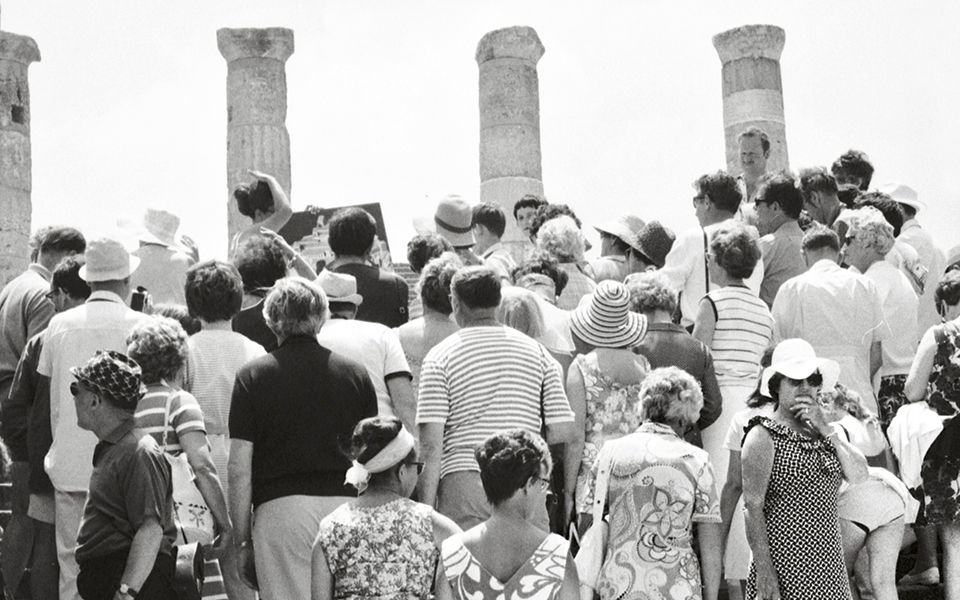
Tourists have been visiting the acropolis of Lindos in great numbers since the 1970s.
© Getty Image/Ideal Image
Despite their desire to remain on the island for good, the Italians were forced to leave after surrendering to the Germans following the Battle of Rhodes in 1943. They left behind some impressive works, made even more noteworthy by the fact that the rest of the country had been devastated by bombardments.
Their “legacy” also included the special tariff and tax regime for the Dodecanese, which was kept in place even after Rhodes, along with the other Dodecanese islands, was formally united with Greece. Up to 1981, when Greece joined the EEC, visitors to Rhodes could buy tax-free items such as drinks, cigarettes and brand-name clothing items, which were not even imported into the rest of the country. This gave enormous impetus to domestic tourism. Many still remember the elegant umbrellas and, in particular, the suits, tailored on the island for much less than they would have cost in Athens.
In post-war Greece, tourism was seen as the quickest way to achieve economic growth, raise the morale of the Greeks, westernize society and introduce new lifestyle models. Rhodes was one of the few destinations where all the ingredients to achieve this were already in place. Bright sun, perfect climate, long beaches and fascinating antiquities, in fact all the main elements of Greece’s “identity,” feature here, along with stunningly exotic architecture dating to the time of the Knights and the periods of Ottoman and Italian rule.

The King Paul and Queen Frederica of Greece on the set of “The Guns of Navarone” (1960) at Epta Piges, with cast members Gregory Peck, David Niven, Anthony Quinn and others.
© Antonis Pachos Archive
The film industry, too, helped advertise the uniqueness of Rhodes. Cinemagoers, first in Greece but soon all over the world, began to see – on the silver screen – cyclists riding along impressive coastal stretches, bathers swimming in crystal-clear waters, and couples falling in love in the great Rotunda at Kallithea.
In rapid succession a number of Greek and international movies were made here, facilitated by low production costs, while the mayor at the time, Michael Petridis, who is still fondly remembered by many Rhodians, also lent a helping hand by inviting celebrities for holidays at the luxury “Hotel of the Roses”.
Thanks to films such as “Anna Roditi” (1948), “Surprise Package” (1960) with Yul Brynner, “The Guns of Navarone” (1961) with Gregory Peck and Antony Quinn, “Cruise to Rhodes” (1960) and “Kiss the Girls” (1964), parts of the island became famous on a global scale. The Greek National Tourism Organization also made a significant contribution by restoring buildings and erecting the Rhodes Xenia, one of a series of modern hotels at the forefront of efforts to promote tourism.
Local businessmen also built a number of luxury hotels. “The Italians left us 700 beds and today we have 100,000,” says Vassilis Minaidis, honorary president of the Association of Rhodes Hoteliers, which was established in 1949. “The big tour operators got in on the action in the 1960s, when the charter flights began. At the time, most visitors were from Sweden. They came from Stockholm in propeller-driven aircraft in 7-8 hours. Shortly after, the Germans began to arrive, on vessels from Yugoslavia, booking through Touropa, the forerunner of today’s Tui.”

Aristotle Onassis takes Winston Churchill for a ride, in 1959.
© Antonis Pachos Archive
Rhodes soon became a destination for the international jet set. Aristotle Onassis could be seen wandering about or eating octopus at the Alexis Taverna with Winston Churchill; David Gilmour bought a house in Lindos, another Pink Floyd member, Richard Wright, met and later married Franka, owner of the legendary Qupi Bar in Lindos, while Boney M and ABBA, two of the biggest groups of the time, appeared at the Aquarius Club in Rhodes Town. Even the Palace of the Grand Master hosted European beauty contests!
This was also the time of the phenomenon known as “kamakia” (literally “harpoons”): lotharios dressed in bell-bottoms and half-open shirts that invariably revealed a gold chain hanging from the neck, who were a big hit among liberated northern European females.
“Rhodes was a real hot spot in the 1970s. Greek women rarely had pre-marital sexual relations. In contrast, romances with foreign women were a daily occurrence,” says 62-year-old Yiannis Klouvas, these days the President of the Association of Restaurateurs, then owner of the some of the top discotheques on the island, who is married to a Finnish tourist he met at the time. “But it wasn’t just the sex. We took them dancing, we showed them around the island and so there were many love affairs.”
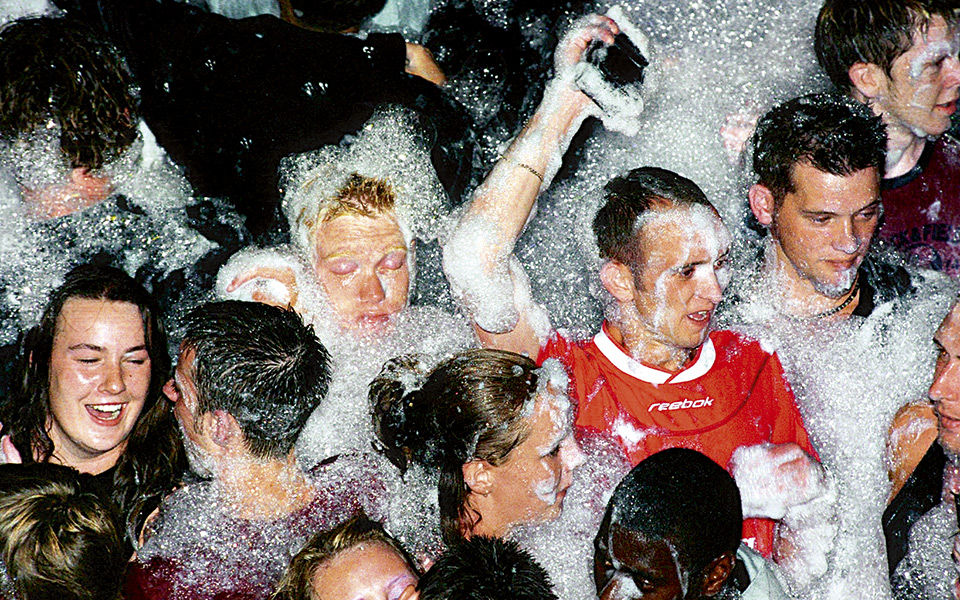
British tourists having fun in Faliraki.
© EPA/ Eirini Eleftheraki
The phenomenon also had social implications, for Rhodian philanderers suddenly had an incentive to remain on the island instead of going to sea to earn a living. At the same time, they were initiated into a cosmopolitan culture and – albeit unwittingly – became magnets of attraction for tourism, since many of these northern European women would come back for more, bringing their female friends with them.
Many foreigners had already begun to settle permanently on the island, but the “kamakia” phenomenon reinforced this trend, as it was not uncommon for local men to marry their summer loves. In the 1980s, Rhodes’ tourism image began to change after a new law was passed, permitting the erection of small, lower category accommodations. Where in previous decades large luxury hotels had dominated, the island now filled with rooms to let, managed by people with no experience whatsoever in tourism.
Bed supply gradually exceeded demand and tour operators, who were always waiting in the wings, took advantage of the low standard of services to reduce prices. British tourists having fun in Faliraki; this resort became for a time the symbol of “bad” tourist behavior before local authorities took steps to clean up its image. Today, Faliraki is more of a family destination. The Water Park, seen here, is one of the biggest in Europe.
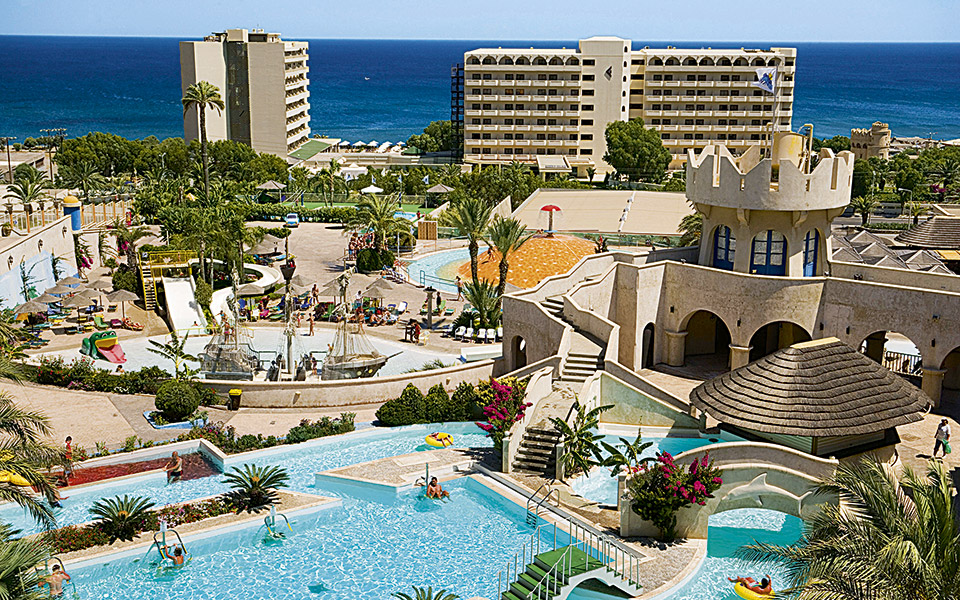
The Water Park in Faliraki, one of the biggest in Europe.
© Getty Image/Ideal Image
July 2000: Young English tourists have sex in public in the alleyways of the village of Faliraki and drunken women dance topless on the hoods of cars. Disorderly crowds of tourists wander about, bottles in hand. They will never learn anything about the real Rhodes, nor will they remember who or how many they slept with the previous night.
Beginning around 1995, several tour operators had discovered in this once quiet village, an amazing beach, numerous cheap rooms for rent and a handful of bars. They promptly voted it the perfect destination for young UK tourists wishing to live for a week or two without constraints. In 2002, a total of 431,481 passengers arrived on a record number of charter flights from the UK; this represented one-third of all charter flights that year.
By 2005, the village had fully adapted to its new guests (from English breakfast in the cafés to soccer games on giant screens, you felt that you were in the UK) and the locals were constantly reporting cases of vandalism.
“It wasn’t the English in general, but certain hooligans who created the problem for tourism. At first they would go to Trianta Beach at Ialysos. By the time they started heading to Faliraki they were out of control. I personally told the British ambassador that they would have to get rid of them; they had become insufferable,” explains Mr. Minaidis.
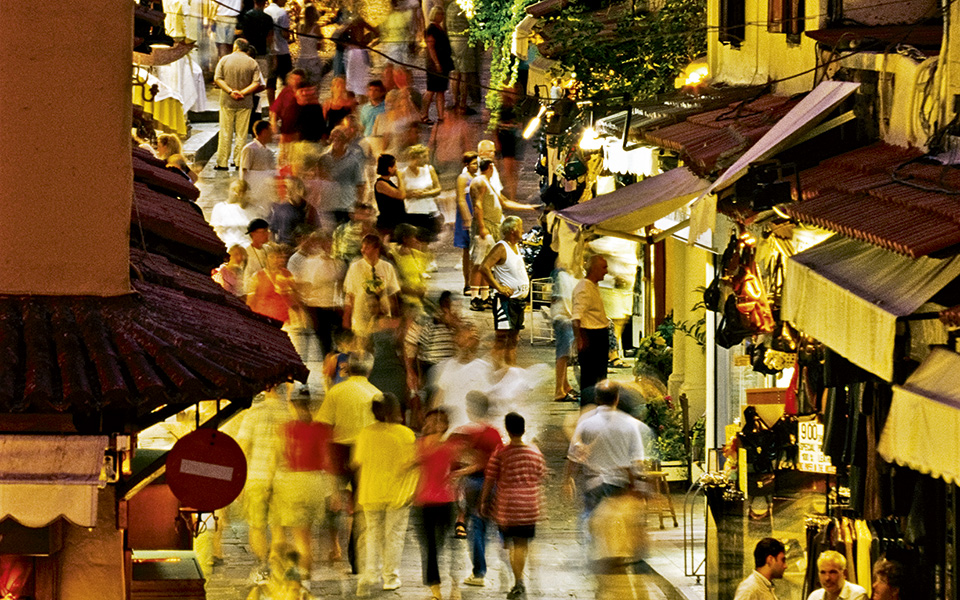
A river of humanity seems to flow through the streets of Old Town.
© Getty Image/Ideal Image
The first allegations of rape and the first accidental deaths due to alcohol prompted negative reports in the British media. Local organizations responded and the tour operators were forced to change their plans. Faliraki was “cleaned up” overnight, as the locals say. And for three or four years it looked like it had been closed down for good.
“Today Faliraki lives in two worlds” says Aikaterini Gogou, president of the the Association of Qualified Tourist Guides of the Dodecanese. “One is that of the large, well-respected hotels and the other is that of the rented rooms. During the day, it is a family destination where kids play on the beach. After sunset, the nightlife is still very lively, though without the excesses of the past. The place is now very well policed.”
The idea of two worlds applies to the island in general. There is, indeed, a Rhodes of deluxe facilities, boutique hotels and a well-deserved reputation for amazing natural beauty and stunning historical attractions, but there’s also the Rhodes of rooms for rent at cut rates, of cheap package trips and of an infrastucture straining to cope with the two million tourists that arrive each year.
Nevertheless, Rhodes is still a welcoming cosmopolitan destination whose ageless appeal has always brought the crowds. The island has always coped in the past and will undoubtedly find answers for the future.
A major restoration project is bringing...
From historic landmarks to edgy street...
From temples and festivals to front...
Before passports and package tours, pilgrims...